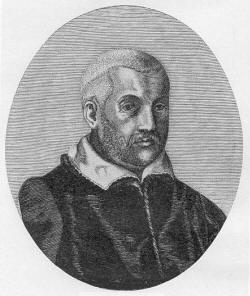

Partner Memmius Frémiot, Daniel Schleicher
Queer Places:
Chiesa della Santissima Trinità al Monte Pincio
Rome, Città Metropolitana di Roma Capitale, Lazio, Italy
 Marc-Antoine Muret (April 12, 1526 - June 4, 1585) was a French humanist.
Muret was born in the village of the same name in the Limousin region, and at
a relatively young age, in 1544, became a schoolteacher; among his students in
Bordeaux, where he lived in 1547– 1548, was
Michel de Montaigne. His life took
a different turn in 1553, when he fled Paris, where he had been well regarded,
after being arrested for sodomy and heresy; documents suggest that he was
saved only by the intervention of powerful friends. As soon as possible, Muret
moved to Toulouse, where he studied and taught law, but his stay there was
brief. In 1554, he fled again to avoid another trial for sodomy and heresy.
Along with his lover Memmius Frémiot (who had also fled), Muret was condemned
to death in absentia and his effigy was burned at the stake.
Marc-Antoine Muret (April 12, 1526 - June 4, 1585) was a French humanist.
Muret was born in the village of the same name in the Limousin region, and at
a relatively young age, in 1544, became a schoolteacher; among his students in
Bordeaux, where he lived in 1547– 1548, was
Michel de Montaigne. His life took
a different turn in 1553, when he fled Paris, where he had been well regarded,
after being arrested for sodomy and heresy; documents suggest that he was
saved only by the intervention of powerful friends. As soon as possible, Muret
moved to Toulouse, where he studied and taught law, but his stay there was
brief. In 1554, he fled again to avoid another trial for sodomy and heresy.
Along with his lover Memmius Frémiot (who had also fled), Muret was condemned
to death in absentia and his effigy was burned at the stake.
Taking refuge in Venice, Muret taught and worked with the great humanist publisher Aldo Manuzio in the publication of Latin classics. In early 1558, he left Venice; according to his friend the humanist Joseph Joost Scaliger (1540– 1609): ‘Muret fled from Toulouse, went to Venice, but having tried to sodomise the sons of some of the most distinguished noblemen, he then fled to Rome. … He was a learned man, but in Venice they could not stand him because of his pederasty.’ Scaliger, however, exaggerates; Muret's biographer, Dejob, emphasises that he was never put on trial in Venice. Nevertheless, private letters suggest that it was rumours about his homosexuality that led him to leave the city.
Muret now took a teaching post in Padua, the seat of a prestigious university, but in 1558 the continuing rumours about his private life led to the loss of his students and obliged him to return to Venice. This catastrophe was the last he had to endure. Thanks to a recommendation from Cardinal Ippolito d'Este, Muret was able to move to Ferrara, then to Rome in 1563, when he obtained a university position teaching moral philosophy, law and rhetoric: this he kept until 1584. In Rome, Muret earned esteem and wealth. In 1572, in return for his cultural contributions, the pope made him a Roman citizen. In 1576, Muret was ordained to the priesthood.
Muret's numerous works include Latin poetry, commentaries on Latin classics, studies of philology (Variae lectiones, 1559– 1600) and rhetoric, ceremonial orations and other writings. His work continued to have a high reputation among later generations, but his decision to become a priest led Protestants to write openly about his homosexuality, whilst Catholics did everything possible to hide it. Dejob, indeed, mentions the existence of a seventeenth-century Apologia pro Mureto criminis sodomiae postulato written by one J. Voigt to defend Muret against rumours of sodomy. In fact, the names of at least two of Muret's lovers are known: Frémiot and Daniel Schleicher, one of his students, whom he called his ‘son who is dearer than anything’, and to whom he wrote a Latin love ode.
My published books: